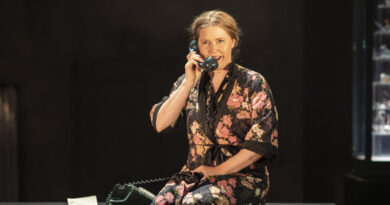“Closer” – Lyric Hammersmith
Neil Dowden in west London
26 July 2022
Patrick Marber’s play Closer became a big hit when first produced at the National Theatre in 1997 (directed by the author). Seen as part of confrontational “in-yer-face” theatre, its bold if cynical exploration of sexual mores touched a nerve in a decade that saw the rise of both lad mags and girl power. The play transferred to the West End and Broadway, won a bunch of awards, and was made into a starry film in 2004 by Mike Nichols. Its first UK revival at the Donmar in 2015 showed that Closer still made a strong impact.

Sam Troughton and Nina Toussaint-White. Photo credit: Marc Brenner.
This new production at Lyric Hammersmith by Clare Lizzimore takes a different approach, not trying to update the play from its 1990s portrayal of male/female relations – which have evolved significantly since then – but presenting it in a way that creates some distance from that period. Even if this staging seems over-complicated, the essential drama still provokes and disturbs thanks to the quality of the dialogue and strong performances.
Closer focuses on the intertwining relationships between four characters, two male and two female. Obituary writer Dan helps self-described “waif” Alice to hospital after she has been hit by a car, where she is treated by dermatologist Larry. A year later Dan is about to publish his first novel using Alice’s experiences as a stripper, but their relationship is threatened when Dan falls for the publicity photographer Anna. Larry then hooks up with Anna after an online prank by Dan. Thereafter each couple splits, with partners swapping, followed by attempted reconciliations that end messily.
As the title suggests, the play is about intimacy, but although all the characters seek it none are able to sustain it – either through lack of commitment or due to fear of being hurt. Can’t live with, can’t live without. Love and lust do not always make good bedfellows. Marber delves into the dark, sordid side of sexual relationships, including deception, cruelty, jealousy, and manipulation, but there is always a sense of the characters’ vulnerability as well as their deviousness. Even if it is difficult to sympathize much with anyone, the men definitely come out worse in this awkward dance of neediness and infidelity.
Marber’s pithy and witty lines often spear the jagged intersection between romance and desire. Probably the most famous is when Larry says the human heart “looks like a fist wrapped in blood”, conveying the play’s emotional violence. Anna claims that men “love the way we make them feel but not us”, drawing the dividing line in the battle of the sexes.

Ella Hunt & Sam Troughton. Photo credit: Marc Brenner.
Marber also touches on the early days of Internet sex, with Dan posing as Anna contacting Larry on an adult chatroom, while a clunky mobile phone with antenna is seen in this show – suggesting that communications technology, while connecting more people, can also have a dehumanizing effect. In a way, all the characters are more at ease with virtual relationships than real ones.
Closer uses London locations in a creative way. London Aquarium (full of cold-blooded, predatory fish) is the location for Larry and Anna’s first meeting, while the Memorial to Heroic Self-Sacrifice in Postman’s Park in the City of London serves as an ironic backdrop to Dan and Alice’s walk together.
Soutra Gilmour’s minimalistic design features a scarlet forestage, but Lizzimore’s production is over-fussy, with distancing effects interfering with the intimate drama. The cast often hang around the edges of the stage when not in a scene, while we see Alice putting on her make-up and wig at a dressing table mirror, adding a slightly meta tone. A dimly lit “chorus” of two men and two women shadow the main actors at the back of the stage, either echoing the protagonists, or serving as supernumeraries. And two on-stage musicians seem an unnecessary addition to the nineties soundtrack.
However, Lizzimore coaxes convincing performances from her cast. Ella Hunt conveys well Alice’s seductive, wild child appeal mixed with damaged spirit who keeps her real name secret – a mysterious muddle of contradictions, she claims to just want to be loved but revels in the fun of lying. Jack Farthing’s coldly controlling, emotionally stunted Daniel is probably the least likeable character. Nina Toussaint-White also impresses as the hard-to-read Anna who prefers to observe people up close through her lens than expose herself. And Sam Troughton is outstanding as the self-loathing, self-proclaimed “fucking caveman” Larry, a funny but pathetic user of porn sites and lapdancing clubs, who is at least honest about his shortcomings amidst a web of deceit









